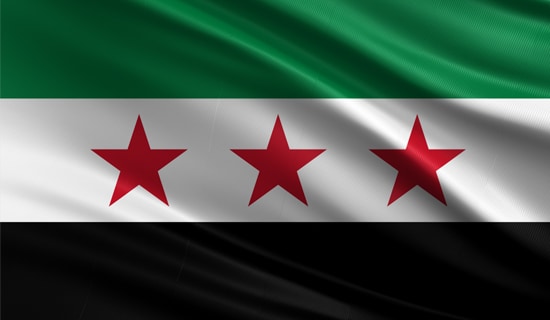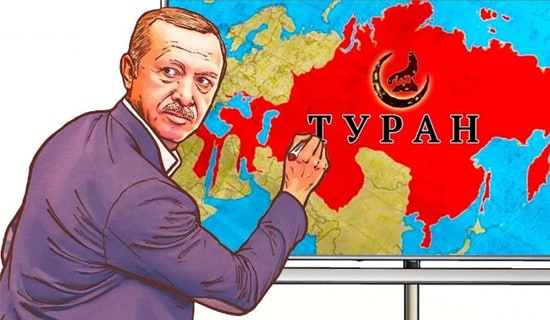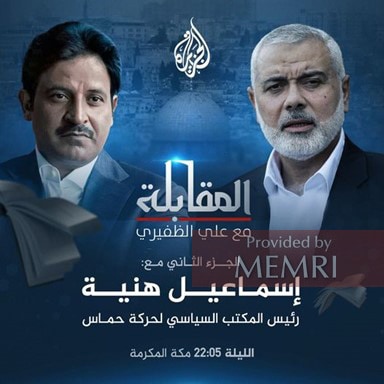
As the conflict between Israel and Hamas in Gaza went on day after day, Al-Jazeera dubbed it "Gaza Resists" and used the phrase in all of its advertising and promos for continuing news coverage. Once the war seemed to die down and even end, the Qatari pan-Arab broadcaster switched from "Gaza Resists" to "Gaza has triumphed."
But this was not the current war in Gaza unleashed by Hamas on October 7, 2023, but a war a decade earlier – Operation Protective Edge – waged in July-August 2014. In this earlier conflict, the symbiotic relationship between Al-Jazeera and Hamas was in sharp relief as the broadcaster followed closely Hamas's own guidelines to the media on how to portray the conflict. The Hamas Ministry of the Interior and National Security had issued a video directive for "Facebook activists" to follow on reporting the war.[1] As The National Interest reported at the time, "the channel's Gaza coverage seems to have taken its cues from Hamas' own media playbook."[2]
The network not only provided wall-to-wall coverage of the war but also gave unstinting, positive, uncut, and premium coverage to Hamas leaders. This included a 40-minute speech and press conference by Hamas political leader Khalid Meshaal but also messages from Hamas's military wing and from the allied Palestinian Islamic Jihad (PIJ) group. Such a scenario of collaboration between Hamas and Al-Jazeera would be repeated in subsequent years. In May 2021, after the end of two weeks of fighting between Hamas in Israel, Hamas political chief in Gaza Yahya Sinwar would be seen on Al-Jazeera giving a victory speech while praising the Qatari broadcaster as "the best pulpit to give the accurate voice to our position."[3]
Origins
But the historical record of Al-Jazeera's open support for Palestinian terrorist operations goes back much further. As early as November 1999, Al-Jazeera had invited Hamas leaders to talk about their "resistance" operations against Israel, and in doing so shattered the long-standing Arab media hegemony of Fatah and the PLO. In 2005, after the full Israeli withdrawal from the Gaza Strip, Al-Jazeera carried footage of Hamas Friday sermons and military parades held in the abandoned Israeli compounds to celebrate the withdrawal.[4] This included remarks by Sheikh Nizar Rayyan, a cleric who was also a senior official in the military wing of Hamas: "The vanquishing of the enemy in Gaza does not mean that this stage has ended. We still have Jerusalem and the pure West Bank. We will not rest until we liberate all our land, all our Palestine. We do not distinguish between what was occupied in the 1940s and what was occupied in the 1960s. Our Jihad continues, and we still have a long way to go. We will continue until the very last usurper is driven out of our land."
At the same 2005 event, Hamas spokesman Mushir Al-Masri commented on Al-Jazeera that liberating Gaza was like liberating Tel Aviv, both were the same. He added a phrase that would become quite famous in the West in 2023: "the weapons of the resistance that you see here will remain, Allah willing, so that we can liberate Palestine – all of Palestine – from the [Mediterranean] Sea to the [Jordan] River, whether they like it or not."[5]
Indeed, the cause of Palestine would be a staple of Al-Jazeera coverage and the media campaigns built by the network around conflict in the Holy Land would be a constant. Other causes would come and go. In 2006, Al-Jazeera's championing of Hezbollah and Hassan Nasrallah during the Tammuz War with Israel succeeded in making the cleric a famous and beloved figure in the region, if only for a few years until Nasrallah sent his fighters into the Syrian Civil War on the side of the Assad regime.
Other media campaigns, especially in the early years after 2001, focused on fawning coverage of Osama bin Laden and Al-Qaeda and later the head of Al-Qaeda in Iraq (later to become the Islamic State or ISIS) Abu Musab Al-Zarqawi. Just as there was a moment when Lebanon was the issue, Iraq had its moment, as did Egypt when Hosni Mubarak was overthrown and the Egyptian Muslim Brotherhood came to power. In all these incidences – Palestine, Lebanon, Iraq, Egypt, and many others – Al-Jazeera was always consistent, taking the side of the Islamist, anti-Western, and anti-Israel part, the hero in the network's narrative. And yet even when it came to Palestine, Palestinian officials, from the time of Arafat to this day, would sometimes complain that the Qatari network preferred the Islamists (Hamas) over the Palestinian Authority and its security forces.[6]
The bias should come as no surprise. It was baked in from the beginning. Both Hamas and Al-Jazeera come from the same root, from various iterations of the regional Muslim Brotherhood political organization. Hamas, officially dating from December 1987, was a Palestinian offshoot of local Islamist groups heavily influenced by the Egyptian Muslim Brotherhood. Al-Jazeera, launched in November 1996, began from a cell of staffers initially hired and then fired by BBC Arabic.
Early Al-Jazeera staffers had ties to the Syrian and Egyptian Muslim Brotherhood. The network's director for many of those early formative years (2003-2011) was Palestinian Wadah Khanfar. A subsequent director, the Jordanian Yasir Abu Hilaleh (2014-2018) was a well-known Islamist.[7] And looming over all the channel's staff, no matter their personal preference or orientation, was Qatar's openly Islamist foreign policy, not just strongly pro-Palestinian but strongly Palestinian Islamist as it favored similar causes elsewhere, from Turkey's Erdoğan to Afghanistan's Taliban.[8] The support and the bias in favor of Hamas and Islamist causes is both institutional and personal.[9]
And the cross-fertilization on the screen among Al-Jazeera's (and Qatar's) various pet causes and favorites – Hamas, Erdoğan's Turkey, Jihadism, Political Islam, antisemitism – was always there through the years. You might see Erdoğan on Palestine, Hamas's Khalid Meshaal praising Al-Jazeera cleric Yussef Al-Qaradawi or Hamas speaking on antisemitism. So, for example, a 2016 Al-Jazeera interview with Hamas leader Mahmoud Al-Zahhar included the charge that President-Elect Trump was possibly a Jew, but that even if he was not, "he loves the Jewish religion and even more, Jewish money."[10] Sinwar was not mistaken when he called Al-Jazeera, the best of pulpits.
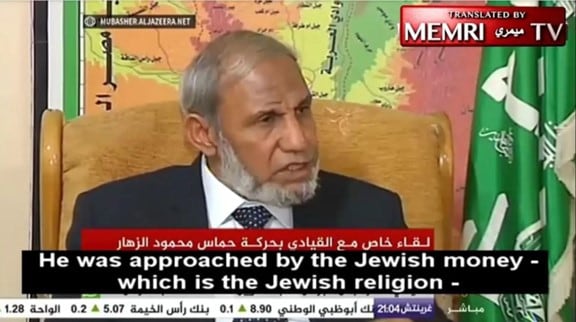
Senior Hamas official Mahmoud Al-Zahhar on Al-Jazeera, November 8, 2016.
More War, More Popularity
Al-Jazeera was deeply interested in and invested in the cause of Palestine but what was the receptivity of the Palestinians themselves to the influence of the Qatari network? The most recent Shikaki (PCPSR) Poll (carried out May 26-June 1, 2024) reported that "Al-Jazeera is the most-watched TV station in Palestine with 68% selecting it as the one they watched the most during the past two months. West Bankers are more likely than Gazans to watch Al-Jazeera, 82% and 46% respectively [partly due to the inability of many in Gaza to watch TV]. The distant second most popular TV station is Hamas's own Al-Aqsa (4%) followed by Palestine TV (3%), Palestine Today, Saudi-owned Al Arabiya, Ma'an and pro-Iranian Al-Mayadeen (2% each)."[11] Similarly, the previous Shikaki poll, published in March 2024, found Al-Jazeera to be the most watched (61%) with the second-place station at only 4% (Palestine Today).[12]
While all polling in the Middle East, even the well-respected PCPSR polls, should always be treated with caution, these results generally ring true. The latest results are even more striking if one looks at the last poll before the current war, from early September 2023, we see that Al-Jazeera was still then most watched station at that time but the figures were much lower – 28% with Hamas's Al-Aqsa a distant second at 11% (4% on the West Bank, 22% in Gaza).[13] The percentage of Palestinians watching Al-Jazeera has more than doubled since the outbreak of the war – 28% in September 2023, 61% in March 2024, and 68% in May 2024.
Covering the Gaza War has been a priority for the channel from October 7. A key part of Al-Jazeera's effectiveness as a media or propaganda outlet is its willingness to lavishly devote airtime and resources to breaking news, particularly to news events of its own choosing. So that the network in a sense does not just cover the news, it makes it, working closely with its political and militarized partners (in this specific case, Hamas and its allies). This is especially true in covering live events that conform with and shape a previously expressed narrative. As Brussels-based Palestinian activist Amjad Abu Koush has noted: "It seems that five months of annihilation are not enough for Al-Jazeera TV, in its efforts to garner as much viewers and like-clicks as possible."[14]
It is that specific combination of breaking news and propagandistic spin that has made Al-Jazeera so popular among Palestinian audiences. That is the likely reason why its viewership seems to have more than doubled. It is telling its viewers both what they think they need to know, in terms of coverage, and also what they want to hear, in terms of an overall narrative.
A Consistent Narrative
And what is Al-Jazeera's narrative, specifically when it comes to Palestine? There is a sturdy consistency going back more than two decades to the current Al-Aqsa Flood War of 2023-2024.
First of all, in the Al-Jazeera narrative on Palestine, Palestine is not "winning" (it is certainly not losing) but rather it (in this case "Gaza") has already won.[15] The "victory" in the current war was not achieved, as in other conventional conflicts, with the situation at the end of the war but rather announced at the beginning. October 7 is portrayed as a victory in a way as if December 7, 1941, was both the beginning and the defining moment of the conflict between Japan and the United States. As if the conflict had ended with the deterrence or shock inflicted on the Americans on that day.
Al-Jazeera fired the first media shots of the war. The October 7 war was formally first announced in a recording by Hamas military commander Muhammad Deif on Al-Jazeera, a fact that shows a high level of coordination and appreciation by Hamas of the role Al-Jazeera had played in previous conflicts and would play in this one. In that recording Deif called on all Palestinians elsewhere, not just in Gaza but also on the West Bank and inside Israel to rise up with any weapon they had on hand.
Since that date Al-Jazeera has essentially functioned as Hamas TV around the clock, making it, unsurprisingly, essential watching for Palestinians trying to understand what is happening on the ground.[16] That thirst for knowledge comes with a price as information is filtered through the Hamas and Al-Jazeera ideological lens.[17]
The Qatari channel's direct material support and service to the Hamas war effort are both massive and multi-faceted and have included:
• Broadcasting threats by Hamas leaders and leaders of other terror organizations;
• Celebrating and praising the terror attack and missile attacks on Israel;
• Airing hostage videos to exert pressure on the Israeli government;
• Broadcasting military announcements on an almost daily basis;[18]
• Airing footage on military encounters and the killing of IDF soldiers;
• Broadcasting near IDF troops and airing analysis by military experts to advise Hamas fighters on recommended tactics and maneuvers;
• Pinpointing potential Israeli quality targets;
• Fabricating anti-Israel propaganda;
• Fabricating information designed to thwart Israel's instructions to the Gaza population;
• Silencing any criticism of Hamas, and constantly rebroadcasting Hamas war propaganda focusing on IDF soldiers killed in the fighting; Hamas statements in Hebrew inciting the Israeli public against its government, including scenes from the current hostage families' demonstrations in Israel; and Hamas propaganda referring to every city, town, and community inside Israel as a "settlement";
• Describing the hostages abducted by Hamas on October 7 as "convicted prisoners" – equating them with the convicted Hamas terrorists in Israeli prisons – and referring to the young Palestinian adults in Israeli custody as "children";
• and Propagating the lie that IDF soldiers raped Palestinian women during the attack on Hamas terrorists at Al-Shifa Hospital in Gaza.[19]
As Al-Jazeera columnist Hani Ismail Muhammad, an Egyptian Islamist based in Turkey, wrote on the channel's website on October 12, 2023, "to complete the victory, Muslims in the east and west of the globe must and should show solidarity with Palestine and Gaza and with the Resistance and its battle."[20] The late Ismail Haniyeh, the head of Hamas's Political Bureau, underscored the already-won victory in remarks broadcast live by Al-Jazeera on January 9, 2024: "We should hold on to the victory that took place on October 7 and build upon it," and he added: "Time is on our side."[21]
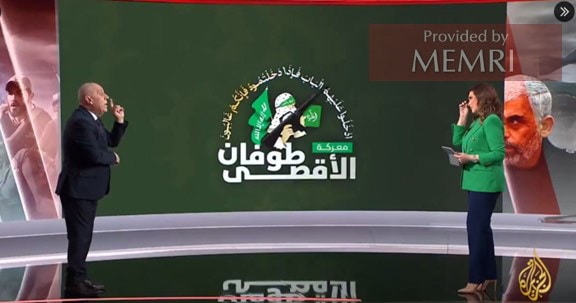
Retired Jordanian Major General Fayiz Al-Dwairi pontificating on Al-Jazeera (July 2024)
One key part of the victory narrative on Al-Jazeera in this war (2023-2024) has been the skewed commentary provided by its chief military analyst Fayiz Al-Dwairi, a retired Jordanian Major General and military engineer.[22] In a glowing profile written by Al-Jazeera staff and posted on its website in January 2024, Al-Dwairi is described as "the Analyst of the Resistance," beloved and eagerly followed by Hamas fighters. And it should be no surprise that he is popular. The piece goes on to gush that Al-Dwairi "was known for his optimistic assessment of the performance of the Palestinian resistance after the Al-Aqsa flood."[23] According to the article, while praising the qualities of the Hamas fighter over the IDF soldier, and pointing out the supposed inadequacies of Israeli equipment, Al-Dwairi rhapsodized about Hamas's military prowess, "there is nothing like it in military history from Alexander the Great until today."[24]
The victory narrative has real power to inspire the masses but it is not fool proof. What Al-Jazeera has been doing is similar to what the organization calling itself the Islamic State or ISIS did in its own propaganda from 2013 on – projecting the image of victory. The presentation of a narrative of success – whether military advances or political progress or steadfastness, etc. – is compelling and attractive but only as long as it is somewhat tethered to reality. If the propaganda gets too far away from the reality on the ground, then it produces a reverse reaction where it is not believed. This is somewhat like the boasting of Arab regimes in the June 1967 war with Israel, which then turned out to be false and exposed these regimes to ridicule. Arab regimes – one may remember Iraqi Information Minister "Baghdad Bob" (Muhammad Said Al-Sahhaf) during the 2003 American invasion of Iraq – and terrorist groups have tended to exaggerate, if not actually fabricate events involving military success against the enemy.
But while both Al-Jazeera and Hamas do exaggerate and fabricate, they also know that they cannot fabricate an entirely false reality out of whole cloth. The spin must be selective. So, a Hamas victory narrative must be based on some objective truths, even if clothed in layers of exaggeration. For such an image to be sustained, the war must end in a way that the claims of victory seem somewhat plausible, even if many or most observers know that this is not really true.
The Hamas/Al-Jazeera victory narrative would find its climax in a visual endgame that included something like a defiant and triumphant Yahya Sinwar coming out of a bunker and speaking to the masses in a public event in the ruins of Gaza. Even if the words are empty and the masses rented, such an event would provide a fitting visual conclusion to the victory narrative. Another relatively effective way of doing it would be, of course, an exchange of Palestinian prisoners for Israeli hostages with scenes of public jubilation as the prisoners raise their hands in victory while exalting national and political symbols. Defiance by the living, claims of steadfastness – surviving the conflict – and mass prisoner releases are the tangible badges of victory that have already been used in past wars between terrorist groups and Israel. They were used by Hizbullah and Al-Jazeera in 2006 and by Hamas and Al-Jazeera in 2014.
Still another Al-Jazeera columnist, Yasser Saad Al-Din, put it this way in April 2024: "Israel has been defeated, but has the Resistance won?" The author relied heavily on Israeli opinions about the war and particularly on criticism by internal opponents of the current Israeli government. But on the Palestinian side, there was no criticism but rather conformity, "the resistance has triumphed militarily, morally and even politically over the occupation army."[25]
A new element in the victory narrative, in contrast with past Gaza conflicts, has been the rise of the pro-Gaza protest movement, especially in the United States, a surprising factor that has not been missed by Hamas or Al-Jazeera. Indeed, even the Houthis in Yemen and Iran's Supreme Leader have praised the movement. Saad Al-Din depicted Israel as "dismantled as an occupation state in the eyes of Western public opinion."
An even more tangible example of victory would have been if the war would have brought Hamas to power on the West Bank, replacing Fateh and the PLO. This was certainly one of the reasons for the October 7 war in the first place. It was a possibility dear to the hearts of both Erdoğan's Turkey and Qatar, two of Hamas's closest supporters. But this was never something that would have happened immediately once the current conflict concludes. The fact that the destruction in Gaza has been so widespread, and that so many leaders, like Muhammad Deif and Ismail Haniyeh, have been eliminated by the Israelis will make the final attempted selling of that victory narrative so much harder at the end of the day. It was a lot easier to push the victory story earlier in the conflict, less so in August 2024. But some sort of effort will be made nevertheless.
In seeming stark contrast to the victory narrative, but actually complementary to it is the "Palestinians are Victims" narrative. Just as a martyr is in a very real sense both a victor and a victim, so do both Al-Jazeera and Hamas seek to highlight as much as possible the suffering of the Palestinian people, highlighting real events, exaggerating others and fabricating still others.
This narrative also requires the playing down of military casualties while highlighting civilian ones. An entire process of linguistic alchemy is required to be put into action in order to make such an approach work. Teenage gunmen become children, Hamas members become independent journalists, Palestinian profiteering becomes Israeli starvation tactics, collateral damage become intentional targeting, failed Hamas/PIJ missiles falling on Gaza facilities become Israeli airstrikes, as in the notorious blood libel about the Al-Ahli Hospital on October 17, only ten days after the beginning of the war.
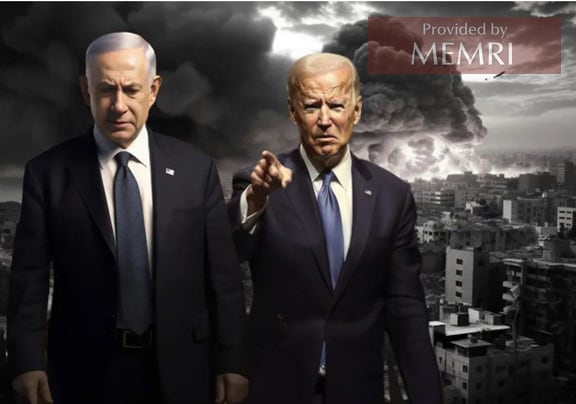
AI-generated image of a defeated Netanyahu and Biden (Midjourney) from Al-Jazeera
No story is complete without a villain and, coupled with the segments on "Palestinians as Victors" and – simultaneously – "Palestinians as Victims," there is a third stool in the narrative: the "Israel is Lacking/Defeated/Finished" component. Military analyst Al-Dwairi on Al-Jazeera describes the Israelis in Gaza as "advancing towards death, fighting without protection against an adversary willing to do anything for victory" and "with great fear for his life, which exposes him to great psychological pressure." It does not matter that Al-Dwairi's analysis of this factor or anything else turned out to be wrong, what mattered is that, in the moment, he provided the cover of supposed expert analysis to what was actually advocacy and confirming the preconceived notions of his Arab and, especially Palestinian, audience: Hamas was winning and the Israelis, as soldiers and as people, were losing, lacking or inferior, solely propped up, if that, by technological prowess given to them by the Americans. As Arab-American columnist Hussain Abdul-Hussain said recently, if you follow Al-Jazeera and other Islamist media, there are "76 years of Israeli failure and Palestinian successes."[26]
Given these factors and the sheer weight and breadth of Al-Jazeera coverage on the Gaza War (analyst Al-Dwairi was featured almost daily for months), it is then not so surprising that Palestinian audiences have responded by tuning in and by expressing views that are broadly in sync with Al-Jazeera's narrative. One might ask, what came first? The Al-Jazeera "chicken" or the Hamas "egg" in shaping and influencing public opinion? The reality being that, as we have shown, both entities came from a common root and shared a common, deeply held, worldview. And both reflect views already held by a significant percentage of the Palestinian population. When asked in a May 2023 poll what has been the most positive or the best thing that has happened to the Palestinian people since 1948, the largest percentage (24%) said that it was the establishment of Islamic movements, such as Hamas and Islamic Jihad and their participation in armed struggle; 21% said that the best thing was the eruption of the first and second intifada. Only 9% saw the establishment of Fateh as the best thing that had happened.[27] The propaganda work of Al-Jazeera on behalf of Hamas was half-done even before the war began.
But important questions remain for the day after. Once the war does end, will Al-Jazeera's numbers decline, from 68% in the latest poll back to 28% in September 2023? It is quite likely that other conflicts or events will rise elsewhere to capture the channel's attention – that is the nature of the news business – although Palestine has been a staple of the channel for decades. What could fill the information gap if Al-Jazeera's numbers decrease? Can the channel's stranglehold on Palestinian public opinion be challenged? And will there ever be a final reckoning for Al-Jazeera's shameless and deadly promotion of Hamas and other terrorist groups, not among Palestinian public opinion but, more importantly, by policymakers in Washington? That is the ultimate question.
* Yigal Carmon is President of MEMRI. Alberto M. Fernandez is Vice President of MEMRI.
[1] Youtube.com/watch?v=VxzZ5cm8ZCw, July 10, 2014.
[2] Nationalinterest.org/feature/the-problem-al-jazeera-11239, September 10, 2014.
[3] See MEMRI Special Dispatch No. 11037, Hamas Leader In Gaza Yahya Sinwar, Israel's Most Wanted – In His Own Words: 'We Support The Eradication Of Israel Through Armed Jihad And Struggle; This Is Our Doctrine'; 'The Brothers In Iran And Hizbullah Spared Us Nothing', December 22, 2023.
[4] See MEMRI Special Dispatch No. 991, >Hamas Friday Sermons in Abandoned Gaza Settlements on Al-Jazeera TV: ‘We Can Liberate Palestine – From the Mediterranean to the Jordan River’, September 21, 2005.
[5] See MEMRI Special Dispatch No. 991, Hamas Friday Sermons in Abandoned Gaza Settlements on Al-Jazeera TV: ‘We Can Liberate Palestine – From the Mediterranean to the Jordan River’, September 21, 2005.
[6] X.com/KhaledAbuToameh/status/1817408090246967320, July 27, 2024.
[7] Al-ain.com/article/resignation-qatar-yasser-al-jazeera, May 10, 2018.
[8] See MEMRI Inquiry & Analysis No. 1527, Al-Jazeera Unmasked: Political Islam As A Media Arm Of The Qatari State, August 12, 2020.
[9] See Special Dispatch No. 10879, Presenters, Reporters From Qatar's Al-Jazeera Praise Hamas Attack, Celebrate Israel's Disaster, October 17, 2023.
[10] See MEMRI TV Clip No. 5758, Hamas Leader Mahmoud Al-Zahhar: Trump Possibly a Jew; Money Is the Jewish Religion, Key to U.S. Decision-Making, November 8, 2016.
[11] Pcpsr.org/en/node/985, May 26-June 1, 2024.
[12] Pcpsr.org/en/node/973, March 5-10, 2024.
[13] pcpsr.org/en/node/955, September 6-9, 2023.
[14] See MEMRI TV Clip No. 10944, Brussels-Based Palestinian Activist Amjad AbuKoush: We Are Paying The Price For 17 Years Of Hamas Policies; Al-Jazeera TV Wants The Bloodshed To Continue So It Can Garner More Viewers And More 'Likes'; Qatar Has Taken Over Palestinian Decision-Making, March 7, 2024.
[15] See MEMRI JTTM report Canada-Based Pro-Al-Qaeda Cleric: Hamas' Claims Of Victory Are Absurd, Its Only Accomplishment Is Increasing The Suffering Of Palestinians, February 27, 2024.
[16] See MEMRI Inquiry & Analysis Report No. 1751, Al-Jazeera Arabic: The Qatari-Owned TV Channel That Promotes Islamist Terrorism Worldwide – UPDATED, May 6, 2024.
[17] See MEMRI Special Dispatch No. 10872, Qatar Enabling Hamas' War Against Israel, October 15, 2023.
[18] See MEMRI TV Clip No. 11011, Al-Jazeera Airs Hamas's Al-Qassam Brigades Video Calling On Muslims To Join Jihad; Shows Ambush Against Israeli Soldiers, April 10, 2024.
[19] See MEMRI Daily Brief No. 587, Al-Jazeera's Gaza Script Sabotaged By Their Ally Hamas, April 1, 2024.
[20] Aljazeera.net/blogs/2023/10/12/7-%d8%a3%d9%83%d8%aa%d9%88%d8%a8%d8%b1-%d8%a7%d9%84%d9%88%d8%b9%d8%af-%d8%a7%d9%84%d9%85%d9%86%d8%aa%d8%b8%d8%b1-%d9%88%d8%a7%d9%84%d9%88%d9%87%d9%85-%d8%a7%d9%84%d8%b6%d8%a7%d8%a6%d8%b9, October 12, 2023.
[21] See MEMRI Special Dispatch No. 11072, Hamas Leader Ismail Haniyeh: We Should Hold On To The Moment Of The Victory Of October 7 And Build Upon It; Time Is On Our Side; Donations To Gaza Are Not 'Humanitarian Aid' But 'Financial Jihad', January 10, 2024.
[22] See MEMRI TV Clip No. 11089, Al-Jazeera Military Analyst Fayez Al-Dwairi Explains Anti-Tank Missile Used By Hamas In Gaza, Adds: It Can Penetrate Israel's Namer APC And Merkava Tank, January 1, 2024.
[23] Aljazeera.net/encyclopedia/2024/1/4/%d9%81%d8%a7%d9%8a%d8%b2-%d8%a7%d9%84%d8%af%d9%88%d9%8a%d8%b1%d9%8a-%d9%85%d8%ad%d9%84%d9%84-%d8%a7%d9%84%d9%85%d9%82%d8%a7%d9%88%d9%85%d8%a9, January 23, 2024.
[24] Aljazeera.net/encyclopedia/2024/1/4/%d9%81%d8%a7%d9%8a%d8%b2-%d8%a7%d9%84%d8%af%d9%88%d9%8a%d8%b1%d9%8a-%d9%85%d8%ad%d9%84%d9%84-%d8%a7%d9%84%d9%85%d9%82%d8%a7%d9%88%d9%85%d8%a9, January 23, 2024.
[25] Aljazeera.net/opinions/2024/4/14/%D9%87%D8%B2%D9%85%D8%AA-%D8%A5%D8%B3%D8%B1%D8%A7%D8%A6%D9%8A%D9%84-%D9%81%D9%87%D9%84-%D8%A7%D9%86%D8%AA%D8%B5%D8%B1%D8%AA-%D8%A7%D9%84%D9%85%D9%82%D8%A7%D9%88%D9%85%D8%A9, April 14, 2024.
[26] X.com/hahussain/status/1818983797553078667, August 1, 2024.
[27] Pcpsr.org/en/node/944, June 7-11, 2023.



